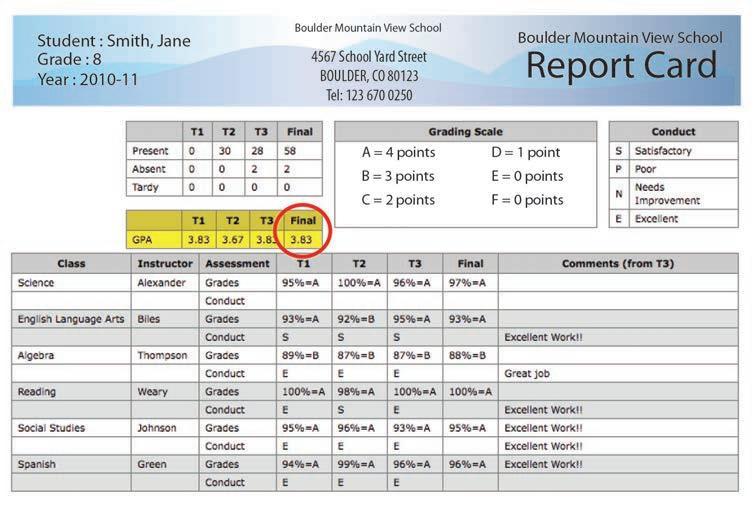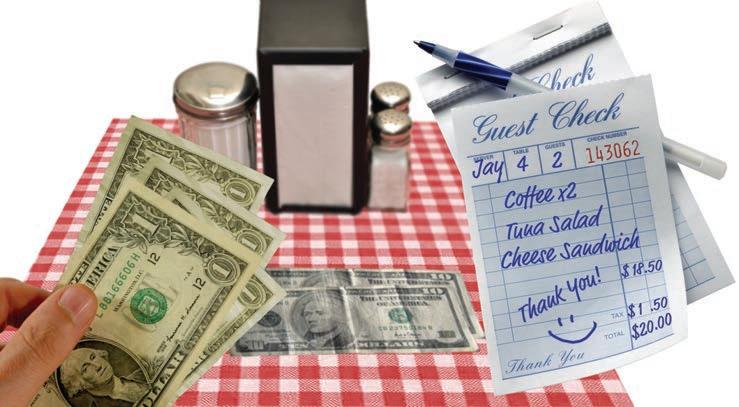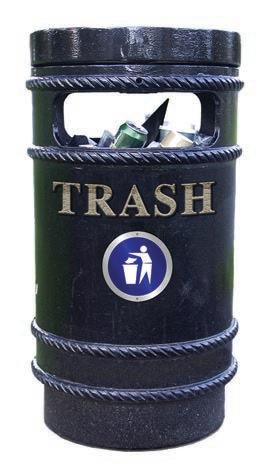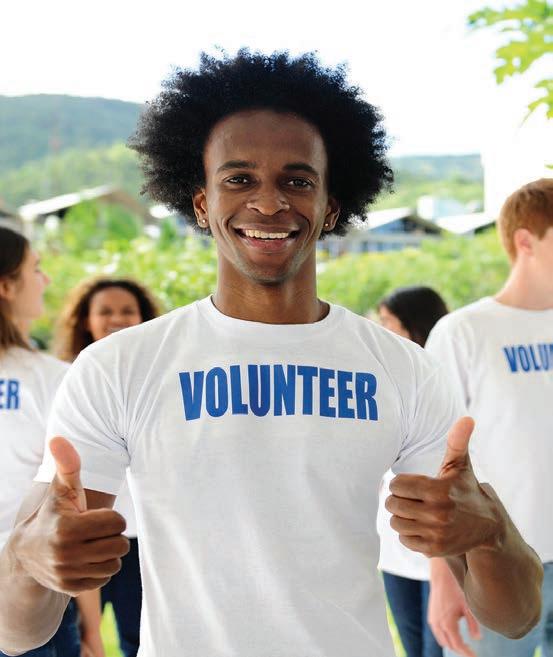
26 minute read
Education System
78) Levels of School
Three- to five- year old children are considered pre-school aged. Children usually start kindergarten in August or September of the year they have their 5th birthday. Elementary school is kindergarten through 5th or 6th grade. Middle school or junior high is usually 6th through 8th grade. High school is 9th through 12th grade. Adults who do not have a high school diploma can take the GED test. The GED is often accepted like a high school diploma.
79) Curriculum & English as a Second Language (ESL)
In elementary schools all the students usually take the same classes. In middle school and high school, students usually have options for classes including languages and arts. Discuss the options with your children and show interest in their classes. All public schools have to provide ESL classes.
(80 & 81) Report Card with GPA example 80) Report Cards
Report cards use grades in the form of letters or numbers to show how well a student is doing in school. Report cards are distributed two to four times a year. Some schools give report cards directly to students, some mail them to parents, and some provide report cards on the Internet. You may have to sign to confirm that you received the report card. Talk to your children about their grades, and congratulate them when they get good grades. Talk to someone at school if you have questions.
81) Grade Point Average (GPA)
Middle school, high school, and college students receive grades lettered “A” through “E” or “F”. “A” is the highest grade and “E” or “F” is a failing grade. Each student has a grade point average (GPA). The GPA is a summary of a student’s grades. Each letter grade has a value shown here: A = 4 points C = 2 E = 0 B = 3 D = 1 F = 0 4.0 is a perfect GPA, but some high schools offer honors and AP classes. In these classes an “A” is equal to more than four points. A high GPA can help students get into good colleges and receive good jobs.
82) SATs, ACTs, & TOEFL 86) How to Help Your Kids Succeed
The SAT and ACT are tests that help colleges evaluate students. Students usually need to take one of these tests to get into college. Typically they take these tests in 11th or 12th grade. Foreign students may have to take the TOEFL to get into college.
83) Finding a School for Your Kids
Every child has the right to a free education up to 12th grade. Contact your school district if you do not want to send your child to the school in your neighborhood. Some communities have charter schools and alternative schools. These schools can help children who do not do well in regular public schools. Head Start is a national program to help preschool-aged children from low-income families. Your participation in the education of your children will impact their success. Schools offer parent-teacher conferences. Attend parent-teacher conferences and talk to teachers about: - How your child is doing. - How you can help. - The homework policy. - Book suggestions. - Any other ideas they have. Ask for an interpreter if you do not understand English. Do not use children as interpreters. In the U.S. it is common for parents to participate in schools, offer opinions, and ask questions of the teachers. You can talk to your child’s teacher at any time during the year. Most schools have a volunteer parent organization, known as a PTA, PTSA or PTO. These organizations can allow you to: - Find great resources. - Meet other parents and teachers. - Give your opinion about how to improve the school.
84) Parent-Teacher Conferences
Read to them and have them read to you when they are ready. Set up and maintain schedules such as a consistent time to go to bed at night and to wake up in the morning. When your child breaks rules, use reasonable consequences. Getting good sleep helps their memory and ability to focus. At home, share chores. Let your children cook with you and discuss ingredients and cooking processes. Get educational toys. Praise your kids as much as possible to reinforce good behavior. Taking your child out of school for a long period of time can hurt their academic progress. If they need to miss school, provide a written note to the school. Create a consistent time at home for homework and reading without TV. If you watch a lot of TV, so will your children.
85) Parent Organizations
Encourage your children to make friends.
87) Extracurricular Activities
Students should participate in one or more after-school activities such as athletic teams, music clubs, theater, and student organizations. This will help them make friends and learn new skills. Demonstrating different talents can help when applying to college.
88) Interactive Teaching Styles
Education is more than just taking notes and listening to the teacher. Adult and young students ask questions, answer questions, and do school activities in small groups.
89) College, University & Vocational Schools
State universities are usually less expensive for students who live in that state. Private universities are usually expensive for all students. Community colleges are less expensive than universities. Vocational schools are for high school graduates who want to develop a specific job skill, such as computer skills or mechanics. There are many federal grants, loans and financial aid to help students pay for college.
90) Learning English
Learning English opens doors of opportunity and allows you to communicate with more people. Learning English is difficult and requires years of practice. Always attend classes, do homework, practice whenever possible with native English speakers, listen to the radio and music in English, and watch TV in English. Don’t be shy or afraid to make mistakes. The people who learn are the people who practice. Mail delivery is usually fast and safe. To address an envelope: 1. Put the address of the person you are mailing to in the middle. 2. Put your address in the top left. 3. Put a stamp on the top right. com, and at many grocery stores. Letters with stamps that weigh less than 1 pound can be dropped in blue metal mailboxes. Post offices have many options for shipping letters and packages.
92) Automated Menus
When you call a business or government agency, it is common to immediately hear a voice recording that greets you with a list of options. To talk with specific people, you need to first listen to a recorded menu and then dial the numbers of the extension of the person you
91) Postage & the Post Office
You can buy stamps at the post office, at usps. want to talk to.

The address of the person sending the mail.

The address of the person receiving the mail.
93) Computers & Internet Safety
Many people communicate through email. You can set up a free email account with gmail.com, hotmail.com, or yahoo.com. When you share your email address with companies, they can share your email address with other companies. Use antivirus software and a firewall to prevent computer viruses and identity theft. Do not open links, photos or attachments from someone you don’t know. Never send an email with personal information including: - Bank account numbers. - Social security numbers. - Credit card numbers. - Passwords. Paying for Internet access at home can be a large long-term cost. Investigate options and check the time period for the contract.
94) Names & Titles
Most U.S. Americans have a first name and middle name given by their parents and a last name, or surname. The last name comes from the father’s family. Traditionally, a married woman takes the last name of her husband, but it is common now for women to keep their own last name. Some people use their middle name and some do not. People usually talk to other people using first names. When you need to address a man formally you use Mr. (Mister). For women use Mrs. (Misses) or Ms. (Miss) depending on different factors. If a man or woman has another title like Dr. (Doctor), use that title to address them formally.
95) Junk Mail & Phony Phone Calls
Be cautious if you have “won” something for which you never applied. Phone calls from people you do not know can be an attempt to get your personal information to steal your money. Gifts or checks marked as “free” often come with services or contracts that you do not want. If you do not want to receive calls from companies that try to sell you things, you can register your phone number on the National Do Not Call Registry at www.donotcall.gov or by calling 1-888-382-1222.

96) Document Storage
Make copies of important documents and keep the copies in a separate safe place. These can include: - Birth certificates. - Car or home titles. - Passports. - Diplomas and school records. You should also keep the following documents filed and organized: - Paystubs, tax forms and other financial documents. - Leases and other contracts. - Automobile, medical, and insurance records. Review credit card and bank statements to make sure that they don’t include purchases or withdrawals you didn’t make.
97) Answering Phones & Checking Messages
Sometimes people consider it rude to answer a cell phone during a meeting, at meals, at the library, or when talking with friends. For this reason, you often need to leave and receive messages. If you have to answer calls in public places, do not talk very loud. In some states driving while texting or talking on a cell phone is illegal.
98) Cell Phone Expenses
If you have a cell phone, understand the minutes and services that are part of your plan. You can get a very large bill if you use more services or minutes than you signed up for. You have to sign a two- or three-year contract with most cell phone companies.
99) Using the Phone Book
In telephone books such as the Yellow Pages the yellow section is organized in alphabetical order from “A” to “Z” by business type. The white section is organized by business or individual name. The beginning section has emergency numbers, and local maps. You can dial 411 or 1-800-555-1212 to find phone numbers and addresses, but those services often cost money. Whitepages.com and google.com are free. Numbers that start with area codes 800, 866, 877, and 888 can usually be called for free from any phone.

100) Daylight Saving & Time Zones
At 2:00 a.m. on the second Sunday in March, clocks are set forward one hour to 3:00 a.m. At 2:00 a.m. on the first Sunday in November, clocks are set back one hour to 1:00 a.m. Daylight Saving is not observed in Hawaii or Arizona. There are four time zones. When it is 11:00 a.m. Eastern Standard Time in New York, it is: - 10:00 a.m. Central Standard Time in Chicago. - 9:00 a.m. Mountain Standard Time in Denver. - 8:00 a.m. Pacific Standard Time in San Diego.

(100) Mainland U.S. Time Zones
MARCH +1 Hour
NOVEMBER -1 Hour
PST MST CST EST
101) Greetings
When you meet someone for the first time, you: - Stand up, smile and make eye contact. - Shake hands firmly. - Say “My name is ____. Nice to meet you.” Hugging is common with family and friends. It is important to remember people’s names.

This section discusses traditional U.S. American values. Not all U.S. Americans or any group of people from the same country or region act the same way. Every individual has his or her own culture. In this section we will use generalizations to get you to think about these differences and think about your own culture.
102) Cleanliness
People usually: - Take a shower or bath every day. - Brush their teeth two or three times a day. - Use deodorant. Many people are uncomfortable with strong body odors, bad breath, chewing gum loudly, and spitting or belching in public. Littering, or throwing garbage or trash in the wrong place outside of your home, is illegal. Put trash and waste in the correct containers. The plumbing system in the U.S. is reliable. Toilet paper is flushed in the toilet, not thrown in the trash can. Do not put anything that is not toilet paper in the toilet.
103) Common Social Taboos
There is some information that people like to keep private. Do not ask people you don’t know very well about their: - Opinions about politics. - Salary or how much they make. - Sexual orientation and practices. - Religious beliefs. - Age or weight. Do not stare or point at people. Do not use bad language in front of children and others who might not approve. In general it is good to smile, open doors for others, and say “please” and “thank you”.
104) Political Correctness
Do not use language that is politically incorrect. See the list below.
Politically correct Politically incorrect or offensive
African-American/Black Negro, Colored
Gay/Homosexual Homo
Asian
Elderly/Senior
Mentally or physically challenged Oriental
Old, Ancient
Handicapped, Retarded
105) Punctuality & Confirming Meetings
It is important to always arrive on time for: - Work and work meetings. - School. - Appointments with a doctor or dentist. For social events, the importance of being on time depends on the situation. Some people see being late as a sign of disrespect. Some people think it is okay to be late for social events. If you are late for an appointment or a meeting, call to let people know and apologize when you arrive. Use a planner or calendar to remember where you need to be.
106) Personal Space and Volume
In the U.S. the physical space between you and the person you are interacting with is usually at least one full arm’s length. Some people do not like when other people speak very loud. People may think you are angry when you talk loud.
If you do not understand something, it is usually better to admit it immediately. This is true especially when it impacts safety at work.
If you tell people you will go to a social event, they expect you to go. It is okay to say
“Thank you for the invitation, but I am not able to attend.” People can get upset if you say “yes” but you do not go.
If a person offers you help and you say “no”, they may not offer again.
108) Small Talk
Small talk is starting conversations about things such as the weather, sports, movies, television, shopping, etc. It can also include topics like your family or your perceptions of the U.S. Small talk can be a way to lead to deeper
106) Personal Space
107) “Yes” Means Yes and “No” Means No
conversation.
109) Humor

Humor can start conversations or relax situations. Sarcasm is common, where people say the opposite of what they mean. For example, a person can say “Wow, it’s really hot outside!” when the weather is very cold. Some people use sarcasm when they are upset, and some use it to be funny. Do not use humor about race, gender, homosexuality, disabilities or religion.
110) Dating & Marriage
It is common for men and women who are not dating or married to be friends. If a member of the opposite sex talks to you, it does not mean that he or she is interested in a relationship. Most married couples wear a wedding ring on the finger next to the little (pinky) finger of the left hand.
111) Religion
People practice many religions, and you are free in the U.S. to choose any religion. Religion is personal and is not talked about in public schools and most workplaces.
112) Gender Equality
Women and men have the same rights and have equal roles in society. Many women have leadership positions in the government and at businesses. It is common for men to do traditionally female jobs such as cooking, cleaning, and taking care of children.

(110) Wedding Rings
(112) Gender Equality

113) Asking Questions
Many U.S. Americans respect people who ask questions. When you do not know how to do something, do not be afraid to ask. Most people will be happy to help you. Do not feel bad if someone tells you that you made a mistake. Ask questions and learn from the mistake.
114) Punishing Children
Using physical punishment at home or at school to punish children is illegal. If children break the rules at school they may have to stay after school or be suspended and not allowed to come to school for a few days. Talk to someone at the school to learn about rules that your children need to follow.
115) Tipping
When you go out to eat, expect to pay 15-20% for a tip. An 18% tip is average. At restaurants it is common for servers to bring your bill before you ask for it. You should also tip your hairstylist, taxi drivers and people who help with your luggage. Never tip a government officer. This includes police officers.

(115) Tipping
116) Dogs
If you have a dog you need to: - Give the dog food and water. - Let the dog outside 3 to 5 times a day. - Clean up after your dog when it goes to the bathroom outside. If you do not take care of your dog, your neighbors may call the police. If you would like to pet a dog: 1. Ask the dog’s owner for permission. 2. Allow the dog to smell your hand and do not put your face near the dog’s face.
117) Crime
Be smart, but don’t be scared of everyone and everything. Common safety suggestions are to: - Lock up your home, car, bike and objects. - walk alone at night in unsafe neighborhoods. - Don’t carry a lot of money or valuables with you. A lot of theft takes place through credit card and email fraud. If you see a crime happen, get to a safe place and call 911.
118) Sex
Prostitution is illegal in most states. Sexually transmitted diseases (STDs) are common. It is important to know your partner’s sexual history. Talk to your doctor or a health clinic for more information about STDs and how to protect yourself.
(116) Dogs

119) Measurement Conversions
The U.S. does not use the metric system. You should learn the following conversions:
1 pound (lb) .45 kilogram (kg) 16 ounces (oz)
1 mile 1.6 Kilometers (km)
1” inch 2.5 centimeters (cm)
1’ foot .3 meters (m) 12” inches
70°F 21.1°C
1 gallon 3.8 liters °F = 9/5 °C + 32
4 quarts = 8 pints
You should know how tall you are (your height) in feet and inches and how much you weigh in pounds.
120) Reading Expiration Dates
Food and drinks that come in containers have an expiration date. This tells you when the food will start to go bad. You can get sick if you eat or drink anything that has expired. Dates are always written in month/day/year format (November 18, 1977 is written as 11/18/1977).
121) Getting Store Cards & Using Coupons
Many supermarkets and office supply stores give discount cards to people who register their name and address. You can also find coupons in newspapers.
122) Garage Sales & Thrift Stores
Garage sales, or yard sales, are usually held on Saturdays and Sundays. People have garage sales to sell used items in front of their homes. You can often find good cheap clothes, furniture and other items at these sales and at thrift stores. You can usually negotiate prices at garage sales.
123) Returns & Rebates
Stores have different rules about when you can return an item. Some give you credit to buy a different item at the store and some will return your money. Be sure to keep receipts for items you might return. Some expensive items come with a warranty, a written agreement in which a company selling something promises to repair or replace it if it breaks within a particular period of time.

124) Public Libraries
Most communities have a public library where you can check out books, music, and movies for free. If you return an item after the due date, you will have to pay a late fee. Many libraries have computers with free Internet access. Libraries often offer classes and can be a good location to learn about community resources.
(124) Public libraries
125) Recreation Centers & Outdoor Activities
Most communities have recreation centers with gyms, exercise equipment, and pools. Recreation centers usually have different payment options. For example you may have the option to pay each time you go or to buy an annual or monthly pass. Most communities also have free public parks that are great for outdoor family activities. Do not leave any trash at the parks when you leave. There are laws about hunting and fishing. Contact the Parks and Wildlife Office in your state for more information. You can receive a fine for hunting or fishing without the correct license.
(125) Outdoor Activities



126) Community Resources
There are organizations that can offer assistance for things such as housing, food, child care, and health care. In many areas you can dial 211 to locate resources. You may need to talk with a few agencies to find the resource you need.
127) Transportation Options
In large cities, buses and metro systems are common. Biking is common in other areas. Taxis are usually expensive.
128) Walking and Biking
When you are riding a bicycle or walking, always assume that cars do not see you when crossing roads. Always have a light on your bike if it’s dark and wear light or reflective clothing. Stay on the right side of the street or path. Only use the left side to pass someone. Always cross streets at an intersection and look for the walk sign.

(128) Walk sign
(129) Walking and biking

129) Recycling
Many communities recycle glass, plastic, tin, aluminum, and paper. Talk to your neighbors or a local government agency to find out what you can recycle and how recycling works where you live.
(129) Recycling
130) Volunteering
Volunteering is a great way to: - Help your community. - Meet friendly people. - Get job experience. - Learn about community needs. - Feel rewarded. Many communities have local agencies that can connect you to volunteer opportunities that match your interests. Examples of volunteeer organizations include food banks, recreation programs, animal shelters, literacy programs, and arts programs. Some websites can help you find volunteer opportunities in your area.
131) Movies
Know which movies are right for children: - G — the movie is for all ages. - PG — parents may want to watch the movie with their children. - PG13 — material may be inappropriate for kids under 13. - R — Restricted — anyone under 17 must come with an adult. - NC17 — no one under 17 permitted. Some movie theaters and other places offer discounts for students and people over the age of 62 or 65. People over the age of 62 or 65 are often referred to as “seniors”.
(130) Volunteering


New Year’s Day — January 1st — The start of a new year!
MLK Day — 3rd Monday in January — Honors Civil Rights Leader Dr. Martin Luther King Jr. On this day there are often marches and gatherings to celebrate civil rights.
Valentine’s Day — February 14th — Traditional day to express love; sending Valentine’s cards, donating to charity, or giving candy or flowers.
Presidents’ Day — 3rd Monday in February — Celebrates the birthday of George Washington, who became the 1st U.S. President in 1789, and Abraham Lincoln, who helped to end slavery in 1862.
Mother’s Day — 2nd Sunday in May.
Memorial Day — Last Monday in May — Honors the nation’s war dead; marks the unofficial beginning of summer.
Father’s Day — 3rd Sunday in June.
Independence Day — July 4th — Celebrates Declaration of Independence from Britain. At night there are celebrations with fireworks.
Labor Day — 1st Monday in September — Celebrates the achievements of workers and the labor movement, marks the unofficial end of summer.
Halloween — October 31st — Children dress up in costumes and “trick-or-treat”, wheree they go around to different houses and politely request treats/candy. Some adults dress up too and go to costume parties.

Veterans Day — November 11th — Honors all veterans of the U.S. armed forces.
Thanksgiving — 4th Thursday in November — Celebrates the giving of thanks for the autumn harvest. Usually involves large family meals with turkey, stuffing, mashed potatoes, and pumpkin pie.
Christmas Eve — December 24th.
Christmas Day — December 25th.
New Year’s Eve — December 31st.
Author:
Content:
Design:
Editing:
Lee Shainis
Rossana Miranda-Johnston
Mario Abela
Kristine Edwards, Jennifer Kurtz, Rachel Fuchs, Arturo Bencosme, and Lara Shainis
Thank you to the many people who have provided ideas, feedback, and support to make this effort possible.
No part of this publication may be reproduced, stored in a retrieval system, or transmitted in any form or by any means, electronic, mechanical, photocopying, recording, scanning or otherwise, except as permitted under Sections 107 or 108 of the 1976 United States Copyright Act, without prior written permission of the author.
Disclaimer
THE INFORMATION PROVIDED HEREIN IS PROVIDED “AS IS” WITHOUT WARRANTIES OF ANY KIND, EITHER EXPRESS OR IMPLIED, STATUTORY OR OTHERWISE. INTERCAMBIO UNITING COMMUNITIES (HEREIN REFERRED TO AS INTERCAMBIO), EXPRESSLY DISCLAIMS ALL WARRANTIES, EXPRESS OR IMPLIED, INCLUDING BUT NOT LIMITED TO IMPLIED WARRANTIES OF MERCHANTABILITY, FITNESS FOR A PARTICULAR PURPOSE, TITLE AND NON-INFRINGEMENT, AND INFORMATIONAL CONTENT.
INTERCAMBIO DOES NOT MAKE ANY REPRESENTATIONS OR WARRANTIES REGARDING THE VALIDITY, ACCURACY, OR RELIABILITY OF, OR THE RESULTS OF THE USE OF THE INFORMATION IN ITS PUBLICATIONS, THE TEXT AND THE WEB SITES CITED THEREIN, MATERIALS ON THE WEB SITES CITED IN THE TEXT, THE PRODUCTS OR SERVICES OBTAINED THROUGH THE WEB SITES CITED IN THE TEXT OR ANY OTHER SITES LINKED TO THE WEB SITES CITED IN THE TEXT. THE MATERIALS IN THIS TEXT OR ON THE WEB SITES CITED THEREIN MAY BE OUT OF DATE, AND INTERCAMBIO MAKES NO COMMITMENT TO UPDATE THE MATERIALS IN THIS TEXT OR ON ANY WEB SITES.
TO THE EXTENT PERMITTED BY APPLICABLE LAW, IN NO EVENT SHALL INTERCAMBIO OR ANY OF ITS DIRECTORS, OFFICERS, MEMBERS, EMPLOYEES, CONTRACTORS, SUBCONTRACTORS, AGENTS, SUCCESSORS OR ASSIGNS (AS APPLICABLE) BE LIABLE TO THE READER OF THIS TEXT, THE INFORMATION, OR THE CONTENT, FOR ANY INCIDENTAL, CONSEQUENTIAL, INDIRECT, EXEMPLARY, MULTIPLE, SPECIAL, OR PUNITIVE DAMAGES RESULTING FROM THE USE OR INABILITY TO USE THE TEXT OR THE INFORMATION CONTAINED THEREIN, REGARDLESS OF WHETHER SUCH LIABILITY IS BASED ON BREACH OF CONTRACT, TORT (INCLUDING NEGLIGENCE), STRICT LIABILITY, BREACH OF WARRANTY, FAILURE OF ESSENTIAL PURPOSE OR OTHERWISE, EVEN IF INTERCAMBIO IS ADVISED OF THE POSSIBILITY OF SUCH DAMAGES.
Although this Text may include links providing direct access to other Web sites, Intercambio has not participated in their development, and does not monitor or exert any editorial or content control over those Web sites.
Since 2001, Intercambio has been teaching English to adults in Boulder County, Colorado. Harnessing the power of volunteerism combined with comprehensive training based on best TESOL practices, we serve over 1,000 adult students a year in both group and 1-on-1 learning environments. With award-winning recognition and extensive experience, The Immigrant Guide was created to help newcomers learn the laws, systems and culture for living and succeeding in the US.
Organizations and programs across the country successfully implement The Immigrant Guide by:
• Integrating with virtually any adult ESL curriculum, specifically Interactive English • Facilitating conversation classes and practice • Leading workshops to bring receiving community members together with newcomers, transforming strangers into neighbors
Available in multiple languages: Arabic, English, French, Karen, Nepali-Bhutanese, Somali, Spanish
(English and Spanish are in full color)
Two companion resources are also available to expand your use of The Immigrant Guide:
2018 Edition PRONUNCIATION FUN Confidence and Connections was developed by Intercambio Uniting Communities to offer practical English language acquisition for adults. WITH PICTURES The series was designed for both 1-on-1 and group learning environments.
The hallmark of this curriculum is its unique focus on building confidence and personal connections between students and teacher. Each lesson culminates with a Connect with Conversation activity, providing students a safe place to practice speaking English while getting to know their “Did you say you are dirty?” “No, I’m thirty!” fellow students and teacher. In addition, every lesson includes a pronunciation exercise to help students learn and practice the many sounds and rhythm of the language.
There are 2 books per level, L (left) and R (right), enabling shorter completion cycles per level. Completing a book builds student confidence and allows a shorter waiting period for a returning student. Together these two books, L and R, complete a level and you can begin with either one.
Build your community by teaching and learning English The Intercambio Way™.
“You eat soap?”
“No, I said I eat soup!”
Intercambio is a 501 (c) 3 nonprofit organization founded in 2001. In addition to our successful
and continually advancing program in Boulder Colorado, we support and share best practices Essential pronunciation practice to build confidence
with organizations across the country that use our curriculum, training and resources. We are committed to learning from everyone. Please share ideas or feedback with us at www.intercambio.org/comments
www.intercambio.org • resources@intercambio.org
intercambio.org
$12.00 ISBN 978-1-947639-16-4 5 1 2 0 0
9 781947 639164
Pronunciation Fun with Pictures
CONFIDENCE AND CONNECTIONS BOOK 1L Student Book
CONFIDENCE
TM


and CONNECTIONS
1L
TM Adult ESL The Intercambio Way
Interactive English Adult ESL
Online resources on many Immigrant Guide topics can be found on our website. Contact us for training and on-going support: resources@intercambio.org
intercambio.org








